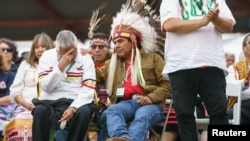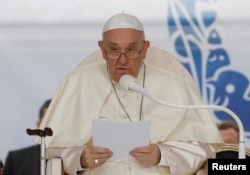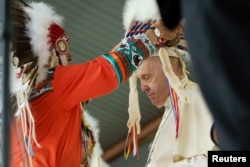Pope Francis said he was “deeply sorry” for more than a century of abuses that First Nations, Métis and Inuit children endured in Catholic-run residential schools in Canada.
He spoke Tuesday in Maskawacis, Alberta, which is home to four Cree Nations — the Ermineskin Cree Nation, the Louis Bull Tribe, the Montana First Nation and the Samson Cree Nation.
“Sorry for the ways in which, regrettably, many Christians supported the colonizing mentality of the powers that oppressed the Indigenous peoples,” Francis said. “I ask forgiveness, in particular, for the ways in which many members of the church and of religious communities cooperated, not least through their indifference, in projects of cultural destruction and forced assimilation promoted by the governments of that time, which culminated in the system of residential schools.”
Francis acknowledged that an apology was not “the end of the matter.”
“An important part of this process will be to conduct a serious investigation into the facts of what took place in the past and to assist the survivors of the residential schools to experience healing from the traumas they suffered,” he said.
Some Indigenous Canadians welcomed the words as a first step.
“I believe that we have a path forward,” Larry Phillip Fontaine, former national chief of the Assembly of First Nations, told the Canadian Broadcasting Corporation (CBC). “He didn’t just say, ‘I am sorry.’ I think he laid out the work ahead of us.”
But others said the pope’s speech fell short of their expectations, noting he apologized on behalf of Christians.
"I'm not hearing what I wanted to hear, which is really to ask for forgiveness, to apologize on behalf of the Catholic Church," residential school survivor Jean-Charles Piétacho, chief of the Council of Innus of Eukanitshit, told CBC.
"It's like it's only a few Christians who committed evil. We're once again trivializing the survivors' situation."
For some, the speech was notable for its omissions.
"I was hoping I would hear more about the unmarked graves that we are uncovering all over Canada," Pimicikamak Cree Nation Chief David Monias told Canada’s CTV News.
Others had hoped Francis would mention the Doctrine of Discovery, a concept of international law that grew out of a series of 15th- and 16th-century papal decrees, which gave European nations license to seize non-Christian lands and enslave Indigenous populations. Indigenous leaders have for years called on the Vatican to rescind those decrees, arguing that they are woven into international law today.
“We cannot hold abusers accountable, seek redress for harm or reconcile with the church, government institutions and, in some cases, our own communities and families until we know the full, unadulterated truth — truth the Catholic Church is actively withholding,” National Congress of American Indians President Fawn Sharp stated in an open letter to the pope on Monday.
Eagle feathers and angry tears
For many, the most noteworthy moment came when Ermineskin Cree Chief Wilton Littlechild, a former member of Parliament and a former commissioner of Canada’s Truth and Reconciliation Commission, presented the pope with an eagle feather headdress. Worn by chiefs, it is a powerful symbol of leadership and authority.
As others in the crowd cheered, a woman wearing traditional white buckskin stepped before the pope and sang what Canadian media initially reported was an anguished version of the Canadian national anthem, “O, Canada,” in Cree.
Singer Sipihko-Kiche-Kisik-Iskwew told VOA the song was not the national anthem but "Ka Kanata" (“Our Village on the Land"), a song she said predates the arrival of Europeans in North America.
“It’s the original anthem of the land. They stole it from us,” she said, translating the lyrics: “This is our village, our home on the land, our love for our children. You make the people of the north proud. From here to there, we will put you under our wing. Father, take care of our village on the land.”
Sipihko identifies herself as an Eagle Clan Mother from the village of Kinew-miskesik-napew (present-day Winnipeg). When she finished singing, she asked the pope to remove the headdress and then delivered a proclamation that she explained was her sovereign right as a Clan Mother.
“If the pope would have removed his funny little hat before they put [the headdress] on, maybe I wouldn’t have reacted the way I did,” she said. “But he didn’t honor nothing. He didn’t remove his little hat to have this greatest honor put on him.”
In her proclamation to the pope, Siphiko said, “You are hereby served lawful notice. We, the daughters of the Great Spirit on these sovereign tribal lands of Turtle Island, cannot be coerced into any law or treaty that is not the Great Law. We have appointed chiefs on our territory. Govern yourself accordingly.”
And she ended the statement with “hiy hiy,” a Cree expression traditionally used to end formal declarations and prayers.
“It means, ‘I have nothing more to say,’ ” Siphiko said. “I turn my back on you.”






